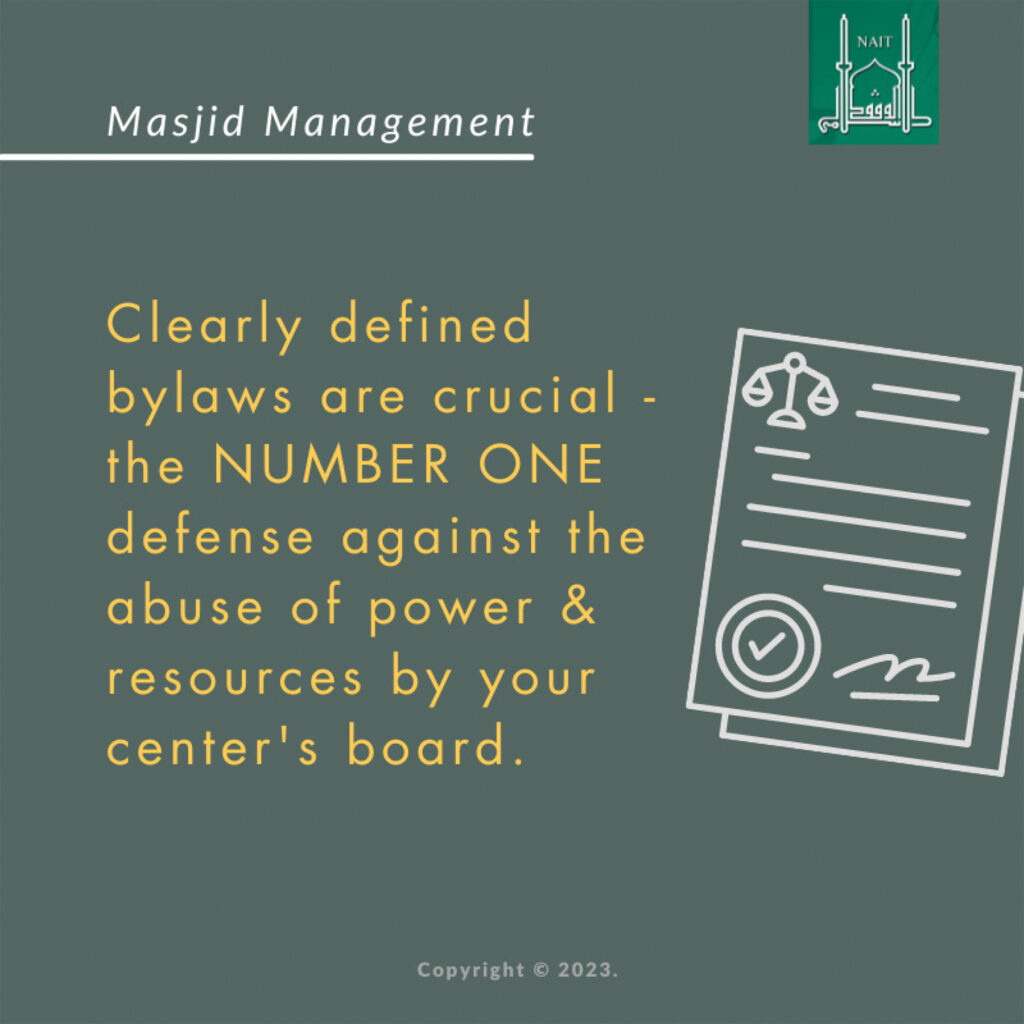The Danger of Ambiguous language
By Sadia Qureshi
Sept/Oct 2023

A Newark, N.J., mosque board secretly sells the building on grounds not approved by the community it was serving. The mosque was also a local waqf (charitable endowment) property. It seems hard to believe, but such a practice has also happened to other mosques in the U.S.
This a consequence of the absence of comprehensive and clear bylaws — something that has given rise to avoidable conflicts, as in the case of two mosques in New Jersey and three in California.
To prevent such practices, clearly defined bylaws can be the number one defense against any mosque board abusing power and resources. The board [jw2] should deal with the following issues when creating or revising bylaws:
• Closing loopholes. If your mosque doesn’t have a published list of bylaws, make it a top priority to create and distribute one. Bylaws consist of agreed-upon policies and procedures, regardless of the mosque’s size or operations.
If such a publication does exist, revisit and update all the vague and inadequate provisions with the guidance of a legal expert. Close any loopholes that may inadvertently grant excessive authority to the mosque’s board [jw3] and ensure compliance and transparency. Include “provisions of accountability” to protect the congregation against any arbitrary actions and manipulation that could leave the general body powerless and unable to challenge board’s decisions effectively. A “general body” is composed of patrons/community members serving the mosque, whether paying their dues or not, and are registered to vote on mosque affairs. The best practice is to have only paying members, which will avoid manipulation at election time. This general body elects the Board of Directors, an election process in which the mosque’s staff cannot participate.
• Preserving the community’s trust. For mosques operating under a waqf, maintaining its Board of Trustees’(BOT) independence from its Board of Directors (BOD) is essential for trust and transparency. Unfortunately, conflicts arise when both boards are the same or overlap, thereby allowing for potential breaches of trust and abuses of power.
To maintain the waqf’s sanctity, establish clear lines of separation through the bylaws and prevent any collusion between these bodies. Remember: In case of a conflict, the court will not honor a local waqf if the boards of the waqf and the mosque are not separate.
• Relocation and expansion guidelines. Comprehensive bylaws should provide specific guidelines in these two cases, especially when the mosque is a waqf property. The new facilities must be carefully assessed in light of the community’s needs and conducting the vetting processes — something that was not done in the above-mentioned Newark mosque.
• Use of financial resources. Defining the appropriate process and authority for accessing and deploying financial resources by any staff or board member is a key component of formulating effective bylaws. These provisions protect the mosque’s scarce funds that belong to the people it serves from being abused to achieve egotistic goals.
• Effective governance and conflict resolution provisions. Include communication systems and conflict resolution mechanisms to establish effective governance and prevent costly legal battles between the board [jw4] and the general body. Communication transparency and documentation are key to preserving community trust and financial resources.
• Legal Counsel. Without exception, every Islamic center/mosque should seek legal expertise to ensure that its bylaws are consistent, non-contradictory, and legally sound. A legal expert can identify gaps and weaknesses and suggest areas for improvement with proper legal language that safeguards the mosque’s interests and those of the community it serves.
• Removal of Board and Election Mechanisms: Bylaws should be clear and very specific on the following: how to conduct elections, how the board [jw5] can remove one of its members, how the general assembly can remove the entire board and how to govern until the next election is completed.
Well-defined bylaws are essential for effective mosque governance, or any nonprofit for that matter. Clear bylaws enhance transparency, promote community involvement and empowerment, prevent conflicts, and foster a sense of unity and purpose.
Other than the bylaws, one of the best ways to protect mosques is to make them a waqf. If the trustee has strict and systematic mechanisms in place to prevent abuse and manipulation, as in the case of the North American Islamic Trust, issues like those at the Newark mosque would not have arisen.
NAIT’s Waqf is a completely free service that ensures that the waqf continues to benefit the community, as spelled out in the waqf agreement. Selling a center or a mosque entrusted to NAIT is very rare, and a lot of strict conditions must be met before it can be sold. If you would like to protect your mosque through NAIT Waqf, call us at 630.789.9191.
Reprinted with permission from the North American Islamic Trust, Inc.
Tell us what you thought by joining our Facebook community. You can also send comments and story pitches to horizons@isna.net. Islamic Horizons does not publish unsolicited material.
